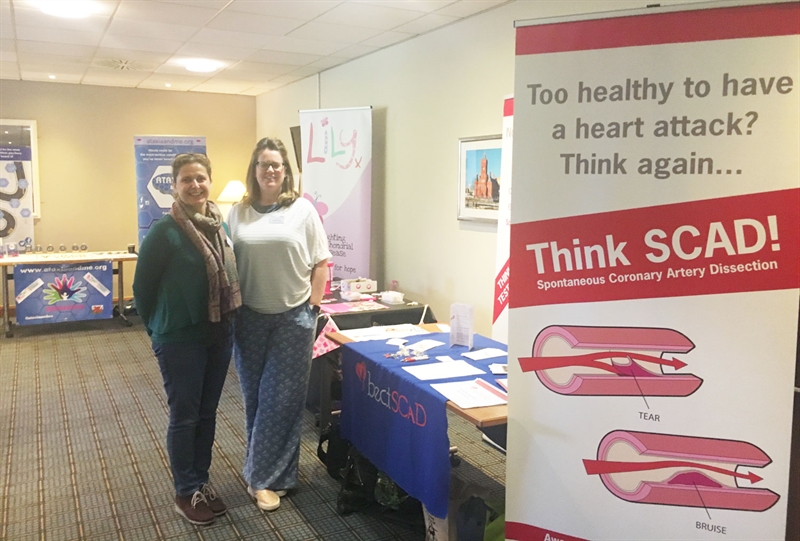On Thursday 18 October, Beat SCAD Trustees Sarah Coombes and Harriet Mulvaney attended the Rare Disease Patients’ Network in Wales event in sunny Cardiff. This was the fourth such annual event and the first one Beat SCAD had attended.
The day was organised and hosted by Genetic Alliance UK (the national charity of 200 patient organisations supporting those affected by genetic conditions and the umbrella body for Rare Disease UK, the national campaign for people with rare diseases and all those who support them) and Wales Gene Park. It brought together many patients, all of whom had a rare disease, their carers and families, healthcare practitioners and other interested parties, to enable networking, sharing of stories, listening to updates on research projects and progress on the Welsh Implementation Plan for Rare Diseases.
The aims for Beat SCAD were to:
- Raise awareness of SCAD
- Secure interest in the work Beat SCAD are doing by asking people to sign up for our newsletters
- Make useful contacts that can support us in our mission in Wales
- Network with other patients and researchers, hear their stories and listen to updates on work
There was a steady of flow of visitors – patients and their families, healthcare practitioners, researchers, representatives from other charities and organisations. It was a fantastic feeling to be sharing our stories, the power of patient-led/inspired research and the amazing work that is going on in research programmes. We sensed a genuine interest in our condition.
There was also the opportunity to attend some of the organised speaking slots throughout the day. Hearing stories from those affected by a rare disease was very moving, and it was a real honour to talk to them when opportunities arose.
Whilst all our experiences were different, there were lots of issues and challenges that were shared: including: difficulty and/or delay in getting a diagnosis, limited information about the condition finding the right person to treat your condition, constantly self-advocating and retelling your story in order to get access to the right treatment, plus dealing with the challenges a rare disease throws at you in addition to ‘just life’.
Sarah was able to attend a session giving an update on the SIGNAL Project (Studying the Implementation of GeNomics in wALes) – click here to read her report. [link]
Harriet heard an update from the Senior Policy Manager at the Welsh Government, responsible for progressing the Welsh Implementation Plan for Rare Diseases, Caroline Lewis. This is a five-year plan, first published in February 2015.
Of the 3.1 million people in Wales, they estimate 150,000 are living with a rare disease. Reference was made to the large number of referrals and treatment outside of Wales but they were not able to provide detail at this event. By Caroline’s own admission, progress against this plan has been slow and the first year was spent identifying leads within each of the Welsh Health Boards, securing engagement with the plan being their first major hurdle. They then identified the plan ‘as was’ wasn’t deliverable so it was re-published in July 2017. Their immediate priorities now are to:
- identify the approach to treatment for patients with unknown diagnosis
- promote these treatment ‘pathways’ throughout primary and secondary care
- analyse in detail the events following all diagnosis of a rare disease and make this available widely
- set out how feedback from patients contributes to rare disease treatment and work.
In summary, some progress has been made in improving the care of people with rare diseases in Wales, but more still needs to be done. Continued exposure and the raising awareness of the Rare Disease Implementation Plan and the Implementation Group with senior management within health boards continues to bring positive returns, however there is ample room to build on this.
Yet again, the day provided numerous opportunities to reflect on the collective power of our individual stories.

